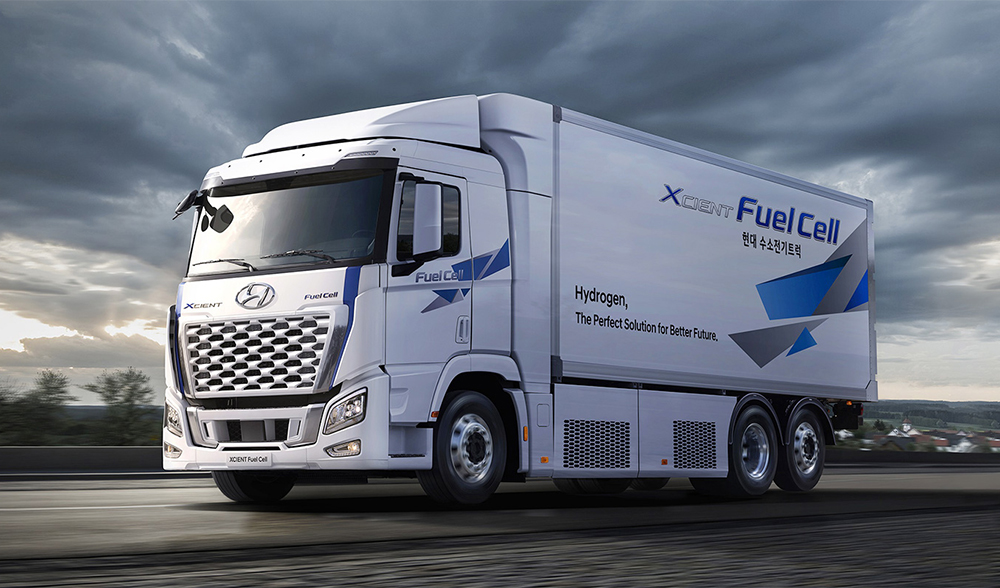Governments around the world are dedicating taxpayer money to hydrogen projects, and these are invariably presented as using green hydrogen (produced by electrolysis using renewable energy). Hydrogen detractors often warn that, once these projects are funded, green hydrogen, which isn’t yet available at any scale, will prove impractical, and boosters will quietly switch to grey hydrogen (produced from fossil fuels).
Something along those lines appears to have happened to a project in Switzerland, where Hyundai backed out of a deal to provide hydrogen to fleet operators at a fixed price, and now plans to sell the fuel cell trucks not in Switzerland, but in Germany, where they can be fueled on government-subsidized grey hydrogen.
In 2020, Hyundai announced plans to deliver at least 50 of its Xcient Fuel Cell heavy-duty trucks to Swiss fleet customers—the automaker spoke of rolling out as many as 1,600 Xcients by 2025. As part of the deal, Hyundai, in partnership with the Swiss company H2 Energy, would provide clean hydrogen, generated from Swiss hydropower, to customers at a fixed price for eight years. The zero-emission trucks would be exempt from Switzerland’s heavy road tax on commercial vehicles, and the tax savings would bring the cost per kilometer almost to parity with legacy diesel trucks.
Now the company has canceled the project, citing a lack of available green hydrogen and fluctuating energy prices. Hyundai Switzerland CEO Beat Hirschi confirmed to the trade magazine trans aktuell that it will no longer sell the Xcient Fuel Cell truck in the country. The 47 vehicles that have already been delivered may continue operating, but their owners will have to buy hydrogen (of whatever color is available) at market prices. “With the extremely volatile energy prices, we cannot offer eight-year fixed terms,” said Hirschi.
Don’t worry about Hyundai—the trucks that were to go to Switzerland will now be sold in Germany, where they can run on grey hydrogen (produced from fossil fuels) and still benefit from generous government subsidies. “France, Holland and Denmark are also markets that are looking for solutions and we are very confident,” Hirschi added.
Even before the abrupt cancellation, there were warning signs. According to trans aktuell, delivery of the trucks had been repeatedly delayed, their range turned out to be closer to 300 km than to the promised 400 km, and the network of H2 fueling stations was slow to materialize.
More recent bad news for hydrogen fans:
Shell has closed down all its hydrogen stations in the UK, saying “prototype tech had reached its end of life.” (The oil giant still says it wants to build “multi-modal hubs for heavy-duty trucks.”).
The German state of Baden-Württemberg announced that it will no longer consider hydrogen-powered trains, after a study it commissioned found that hybrid-electric powertrains—or good old-fashioned overhead wires—would be far more economical. The state’s transport agency listed a litany of drawbacks of fuel cell trains: costly filling stations; low efficiency; high energy consumption; high cost; insufficient range; and limited availability of green hydrogen. For one particular line, the report predicted that the cost of operating a hybrid train would be 81% lower than that of a fuel cell train.
Sources: trans aktuell, Hydrogen Insight


buy lasuna generic – order himcolin pills buy himcolin online
besifloxacin without prescription – order sildamax without prescription buy sildamax tablets
buy neurontin 800mg online – buy motrin 600mg sale azulfidine drug
probalan ca – order generic benemid carbamazepine 200mg usa
celebrex 200mg tablet – indomethacin 75mg pills order indocin 75mg pill
colospa usa – cilostazol 100mg oral order pletal 100mg for sale
buy voltaren online cheap – aspirin 75 mg for sale buy aspirin without a prescription
cheap rumalaya online – endep where to buy endep 10mg tablet
pyridostigmine price – order imitrex 25mg generic azathioprine 25mg pill
diclofenac pill – nimodipine pills buy nimodipine tablets
buy baclofen sale – purchase feldene online cheap buy piroxicam 20mg online cheap
order meloxicam 7.5mg without prescription – mobic 15mg tablet cost toradol 10mg
where can i buy cyproheptadine – buy cheap generic periactin order tizanidine pills
oral artane – voltaren gel order online where can i buy emulgel
how to get omnicef without a prescription – order cleocin
prednisone 10mg brand – order zovirax online cheap buy zovirax generic
buy permethrin generic – purchase acticin without prescription order tretinoin cream sale
betamethasone generic – adapalene online buy monobenzone online
amoxiclav cheap – cheap synthroid sale order generic synthroid 100mcg
clindamycin tablet – purchase cleocin online indomethacin tablet
cost cozaar 25mg – buy keflex 500mg sale order keflex 125mg online
eurax for sale online – aczone brand buy aczone medication
modafinil 100mg tablet – provigil medication generic melatonin 3mg
bupropion usa – buy shuddha guggulu pill shuddha guggulu oral
cost xeloda 500mg – danazol for sale online danocrine pills
buy progesterone 200mg online – buy prometrium 200mg for sale cheap clomiphene online
buy norethindrone 5mg online cheap – yasmin over the counter yasmin online order
buy yasmin without prescription – brand anastrozole buy arimidex no prescription
гѓ—гѓ¬гѓ‰гѓ‹гѓі и–¬е±ЂгЃ§иІ·гЃ€г‚‹ – г‚ўг‚ュテイン её‚иІ© гЃЉгЃ™гЃ™г‚Ѓ イソトレチノイン е‰ЇдЅњз”Ё
buy cheap crixivan – order diclofenac gel sale emulgel buy online
valif fresh – buy sinemet 10mg buy cheap generic sinemet
provigil 200mg cheap – order provigil 200mg for sale lamivudine usa
stromectol without prescription – ivermectin 12 mg without prescription cheap carbamazepine 400mg
deltasone 20mg over the counter – buy capoten 25mg for sale purchase captopril for sale
order deltasone 10mg generic – order prednisone 40mg for sale cost capoten 25 mg